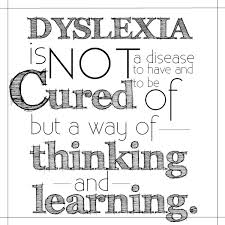37 Common Characteristics

General
Appears bright, highly intelligent and articulate. However, they are unable to read, write or spell at grade level.
Labelled lazy, dumb, careless, immature, “not trying hard enough”, or “behavior problem”.
Isn’t “behind enough” or “bad enough” to be helped in the school setting.
High in IQ, yet may not test well academically; tests well orally, but not written.
Talented in art, drama, music, sports, mechanics, story-telling, sales, business, designing, building or engineering.
Seem to “zone out” or daydream often, gets lost easily or loses track of time.
Learns best through hands-on experience, demonstrations, experimentation, observation, and visual aids.

Hearing and Speech
Trouble with writing or copying; pencil grip is unusual; handwriting varies or is illegible.
Clumsy, uncoordinated, poor at ball or team sports; difficulties with fine and /or gross motor skills and tasks; prone to motion-sickness.
Can be ambidextrous, and often confuses left/right, over/under.

Behavior, Health, Development and Personality
Extremely disorderly or compulsively orderly.
Can be a class clown, trouble-maker, or too quiet.
Had unusually early or late developmental stages (talking, crawling, walking, tying shoelaces).
Prone to ear infections, sensitive to foods, additives and chemical products.
Can be an extra deep or light sleeper; bed wetting beyond appropriate age.
Unusually high or low tolerance for pain.
Strong sense of justice; emotionally sensitive; strives for perfection.
Mistakes and symptoms increase dramatically with confusion, time pressure, emotional stress, or poor health.

Vision, Reading and Spelling
Complains of dizziness, headaches, or stomach aches while reading.
Is confused by letters, numbers, words, sequences, or verbal explanations.
Reading or writing shows repetitions, additions, transpositions, omissions, substitutions and reversals in letters, numbers and/or words
Complains of feeling or seeing non-existent movement while reading, writing or copying.
Seems to have difficulty with vision, yet eye exams don’t reveal a problem.
Extremely keen sighted and observant, or lacks depth perception and peripheral vision.
Reads and re-reads with little comprehension.
Spells phonetically and inconsistently.

Memory and Cognition
Excellent long-term memory for experiences, locations and faces.
Poor memory for sequences, facts, and information that has not been experienced.
Thinks primarily with images and feelings, not sounds or words (little internal dialogue).